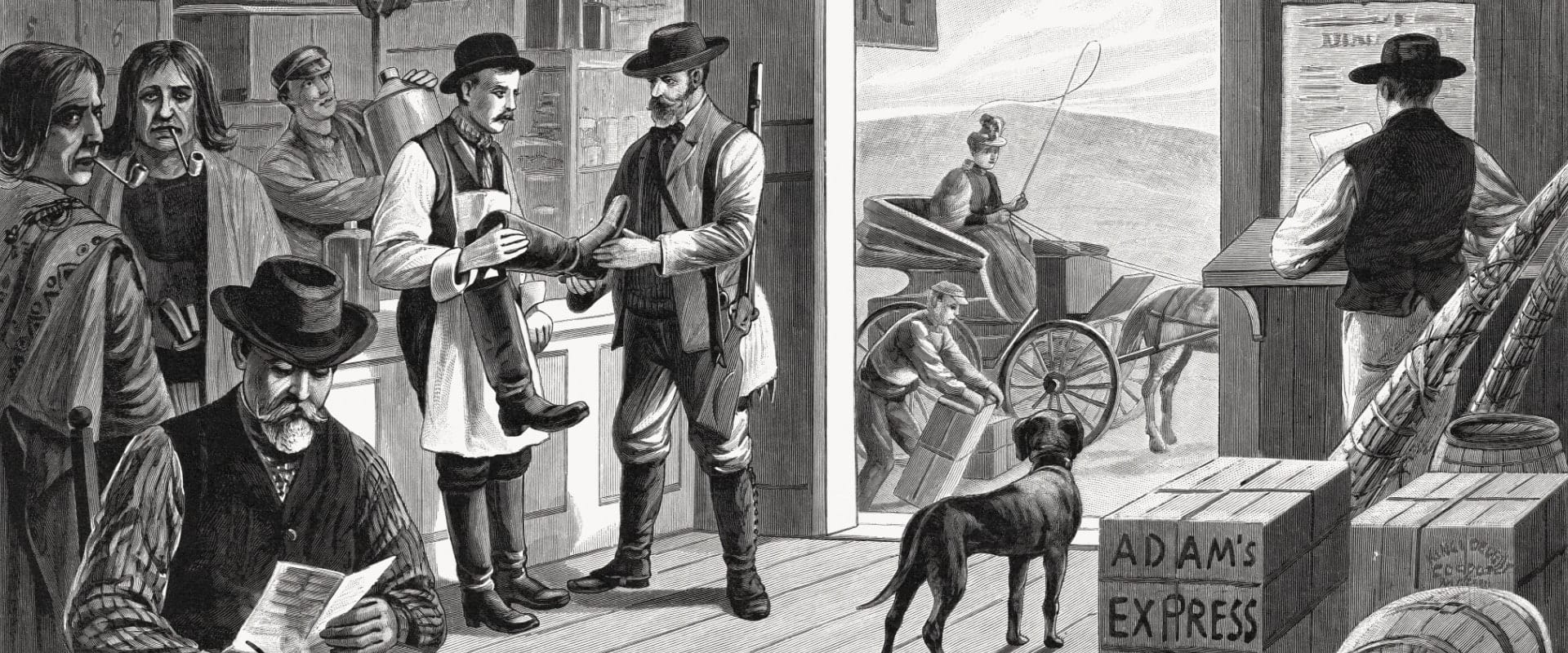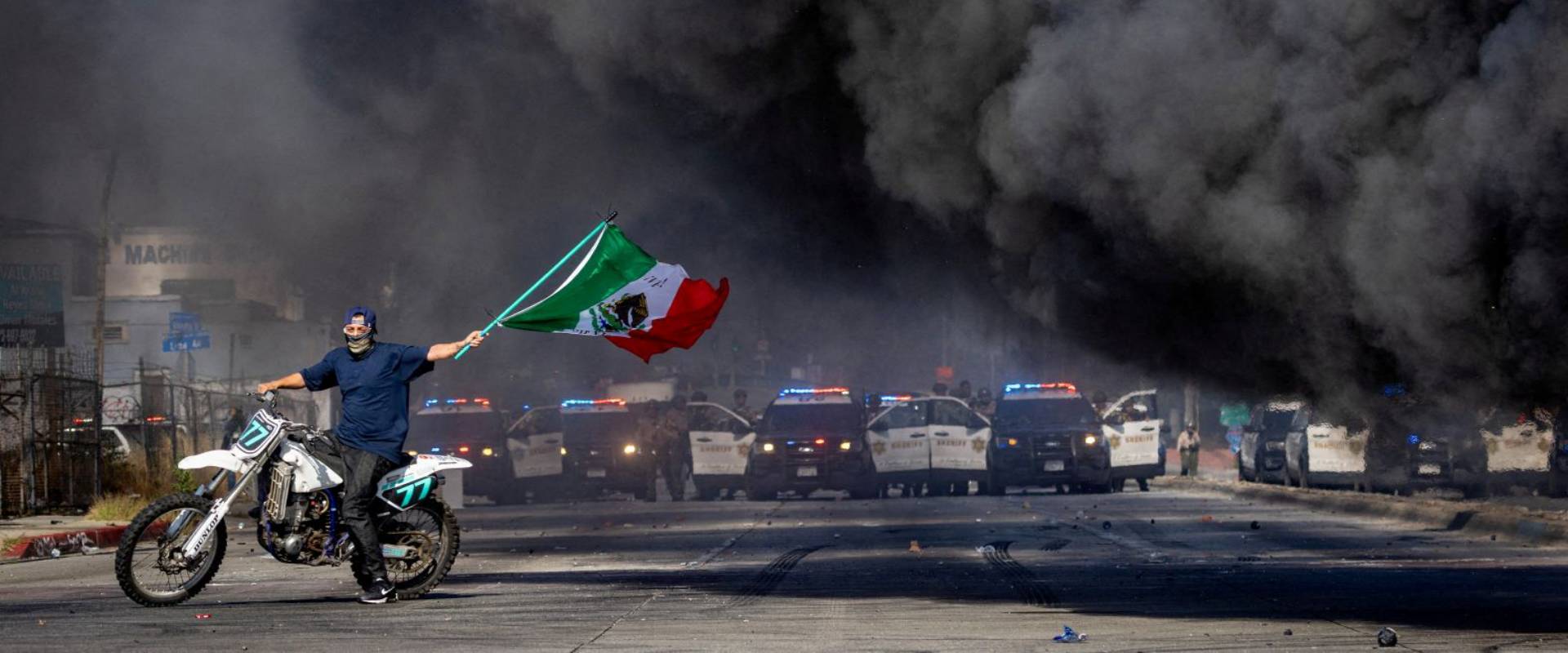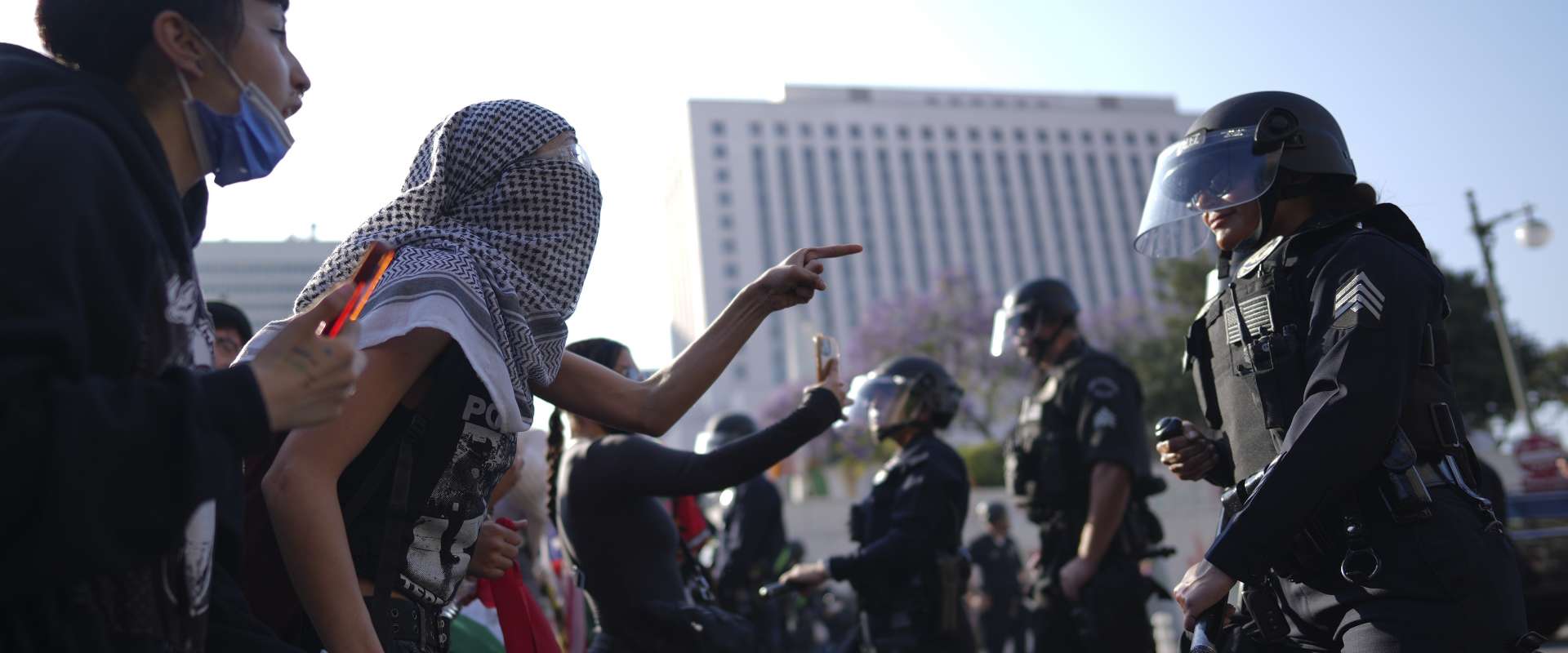Too often morality is the only guide to politics on the left. Oppression and exploitation are obviously disgusting — however, overcoming them takes analysis and strategy, not just outrage.
One example of this is the widespread dismissal of workers in the United States as “settlers,” who, it is claimed, have a continuing material commitment to the oppressive and genocidal policies that founded the U.S. Unfortunately, this attitude is widespread on the US left. Too many dismiss US workers as beneficiaries of US capitalism and imperialism.
“Dripping from every pore with blood and dirt”
The American colonies were of course founded on genocide and slavery. The United States was, in other words, founded as a settler colony. A settler colony is one in which foreign settlers displace a significant portion of the native population. It differs from more typical colonization in which the invaders dominate as a thin layer at the top without expelling and displacing a large section of the native population.
The European settlers engaged in murderous policies toward the Native people almost from day one. The project of the settler population was to steal Native peoples’ land, expel them, and kill them if they got in the way. This was a project of the whole settler population. Though there were developing class contradictions within the settler society, the fundamental contradiction was between the settlers and the Natives. Primitive accumulation for capitalism was based on stealing Native land and exploiting African slaves and indentured servants. This was parallel to the expulsion of peasants from the land in Great Britain.
This process differed in the colonies and in Britain. In England, from the late Middle Ages on, peasants were expelled from the land and turned into a proletariat for rising capitalism. In the American colonies, the creation of a proletariat took longer and was more convoluted. Native peoples expelled from their land did not become the primary basis of the proletariat needed by capitalism. The American colonies were not predominantly capitalist. The Southern population was primarily made up of planters, slaves, and white small farmers. In the North, the population was predominantly small farmers — both subsistence and commercial. Merchant capital dominated in the cities, where the proletariat was a minority. Most manual workers were petit-bourgeois artisans. It would take decades of development within settler society before the proletariat became a major portion of the urban population, much less the majority.
The fundamental contradiction of exploitation sets up a different dynamic in typical modern capitalist states compared to settler colonial states. In settler colonial states, the economic interests of the settlers are aligned with the genocidal project. In developed capitalist economies, the economic interests of the vast majority oppose capitalist interests.
The American Revolution gave a push to the development of capitalism in the US by eliminating stifling British colonial regulations. The Revolution also spurred further intense colonization of Native land, and buttressed slavery. Independence from the British Empire created a new American empire which was also based on genocide, colonialism, displacement, and slavery.
Colonization of the Americas killed millions of Native people. It also caused the death of millions of Africans in the Middle Passage and after. Colonization brought devastation to thousands of Native societies and laid the basis for the underdevelopment of Africa as well. European colonization attempted to destroy the societies of three continents: Africa, North America, and South America (and later Australia and Asia as well). Colonization was the foundation of the development of capitalism in Europe and thus dispossessed the European peasantry as well. As Marx said capitalism came into existence “dripping from every pore with blood and dirt.”
Settler colonial society versus advanced capitalism
In settler colonial society, internal class contradictions are secondary. The overwhelming project of dispossession of the natives takes priority for all the contending classes in settler society. This was true of the US until the Civil War and is still true of Israel and South Africa today. This means that in a fully functioning settler colonial society, the key to transformation is outside the settler population: the Black population in South Africa, the Palestinians in Israel. Those who want to transform settler colonial societies need to focus on organizing the colonized rather than on the class contradictions in settler society.
The fundamental contradiction of exploitation sets up a different dynamic in typical modern capitalist states compared to settler colonial states. In settler colonial states, the economic interests of the settlers are aligned with the genocidal project. In developed capitalist economies, the economic interests of the vast majority oppose capitalist interests. The whole working class is oppressed and exploited by ruling-class policies and can be won to oppose them. The working class can be the agent of social transformation in capitalist societies. Marxists and others opposing capitalist policies need to orient to the entire working class.
Working-class unity requires opposition to all oppression
For Marxists, unifying the working class to oppose capitalism requires opposing all forms of oppression. Lenin laid this out clearly in What Is to be Done?
“The Social-Democrat’s ideal should not be the trade union secretary, but the tribune of the people, who is able to react to every manifestation of tyranny and oppression, no matter where it appears, no matter what stratum or class of the people it affects; who is able to generalize all these manifestations and produce a single picture of police violence and capitalist exploitation; who is able to take advantage of every event, however small, in order to set forth before all his socialist convictions and his democratic demands, in order to clarify for all and everyone the world-historic significance of the struggle for the emancipation of the proletariat.”
The whole working class can be the agent of socialist transformation. But to achieve this, it must oppose racism, sexism, and all forms of oppression. Otherwise, it will never have the unity necessary to overthrow capitalism. Revolutionaries can appeal to workers based on their material interests in overthrowing the system as well as their disgust at oppression and exploitation.
Revolutionary Trotskyist James Cannon said that the most important question a political party needs to answer is “What to do next?” Political strategy must consider the structure of society. If activists focus on identifying the proper change agent for a settler colonial society, rather than for the modern capitalist society in which they actually live, they will go astray and be ineffective. If they focus only on those outside or on the edges of the working class, they will never identify the potential revolutionary agent.
Is the United States a settler colonial society?
It is undeniable that the United States, historically, is a settler colonial society. However, its economic structure has fundamentally changed since colonial times. In 1776 it was not predominantly capitalist. It was still in the stage of primitive accumulation, a period of transition from pre-capitalist modes of production to capitalism. The primary method of accumulation was stealing Native land and exploiting slave labor. Over the next 90 years it developed a capitalist sector which became predominant by the end of the Civil War. Over that period the class contradiction within the settler population became more and more pronounced. Workers in the cities were no longer directly involved in the expulsion of Natives. Their class interests against capitalists grew more prominent. The accumulation of capital by exploitation of workers came to dominate the economy over time.
By the end of the Civil War, the United States had become a capitalist economy. The fundamental contradiction became the class conflict between labor and capital. Ruling-class accumulation was based primarily on the exploitation of workers. The working class became the force that had the interest in and ability to overthrow capitalism. Certainly, by that point if not before, revolutionaries had to focus on the working class as the force that could transform society. The primary change agent was inside the former settler population as well as among those originally colonized. Those who see white workers as inevitably racist settler-colonizers miss this transformation. Those who support that proposition are reversing historical reality. The majority of the white population in the US ceased to be settlers in the classic sense when they became part of the American working class as capitalism became dominant. No matter their ideology, their economic interests were no longer with the genocidal and slave-based colonial economy which had ceased to exist.
This being said, it is still true that the ideology of the settler colonial state persisted even after the economic structure made it obsolete. It still deforms politics in the US.Settler-colonial institutional racism morphed into new forms of structural racism: Jim Crow, mass incarceration, immigrant deportation and oppression, and discrimination in housing, education, and healthcare. Though it is no longer a settler colonial society, the US is still a society rife with institutional racism in many forms. US. capitalism and its ruling class depend on institutional racism. The only way to end institutional racism is to end capitalism. The only way to end capitalism is to destroy institutional racism.
Writing off white workers as settlers will be as ineffective as going to the opposite extreme and ignoring the fight against oppression.
The identification of whites and other patriots with the US state is in part a legacy of the ideas of the colonial past. Class struggle and political organizing can break through this legacy. The economic structure of modern capitalism undercuts the basis of the reactionary settler legacy. It is no longer in the interests of most whites to uphold the US. state and capitalist class. Settler patriotism now only represents the interests of the ruling class. Settler patriotism among the working class is now pure ideology — false consciousness.
Again, this does not mean ignoring the issue of oppression! As noted before, the working class can only succeed if it combines the fight against oppression with the fight against exploitation. However, the whole working class can be won to this fight. The fight against oppression today includes the struggle for concrete demands such as Land Back for the descendants of the original inhabitants. It includes reparations for descendants of slaves.
It is no longer the case, as in a classic settler colonial society, that only those outside it can effectively oppose it. It is no longer the case that the livelihood of the majority relies on the oppression of the original inhabitants as it did in the thirteen colonies. Writing off white workers as settlers will be as ineffective as going to the opposite extreme and ignoring the fight against oppression.
Recent examples of settler colonial societies include Algeria until 1962, South Africa before and during the apartheid era, and present-day Israel. In these countries, the primary change agent was, and in Israel continues to be, the colonized populations. The US, Canada, New Zealand, and Australia, all originally settler societies, have been transformed into modern capitalist societies. The fight against capitalism can be a project of the vast majority in all those states.
Settler colonial regimes have similarities with each other, but also important differences. Israel, for example, was based on the expulsion of a large part of the Palestinian population and its replacement by Zionist settlers in all class positions. South Africa instead installed a settler population on top of the social structure. Apartheid South Africa based itself on the exploitation of the Black working class. Because of this dependence, Apartheid in South Africa was less stable than in Israel. In both cases, however, the agent of change was outside the settler population. While formal South African apartheid is gone, the economic structure it was based on is still largely intact. Economically if not politically it is still a settler colony.
The most important issue for Marxists is identifying the potential agent of social change. Understanding the structures of different societies is a key part of this identification.
The imperative of working-class unity
Rejection of all whites as racist settlers based on racist actions by white people throughout history is moralistic. It ignores the many instances of cross-race solidarity in US history: abolitionism, the Civil War, Reconstruction, Southern populism, CIO organizing in the 1930s, the Civil Rights Movement and the recent upsurges against racist police brutality. It also ignores the structural basis for cross-race, working-class unity that exists today. It focuses on immoral action in the past rather than the potential economic basis of anti-racism.
The best way to mobilize workers is to appeal to their class interests. Overthrowing capitalism can improve life for the vast majority. Revolution is needed not just to advance economic and social conditions for all but to ensure survival for humanity. Guilt-tripping white workers about their relative privilege is not productive.
Instead, revolutionaries should stress that everyone’s lives can improve with the overthrow of capitalism. The point is to raise the conditions of the specially oppressed, not demand that whites lower their conditions. This will involve winning white workers to support the special demands of people of color. It will involve winning male workers to support the special demands of women, straight and cis workers to support the demands of LGBTQ and trans workers, and so on.
Moral outrage can be a good motivator of political struggle. However, it is never enough as a guide to political action. Failure of political analysis will result in defeat and the continuation of oppression and exploitation.



